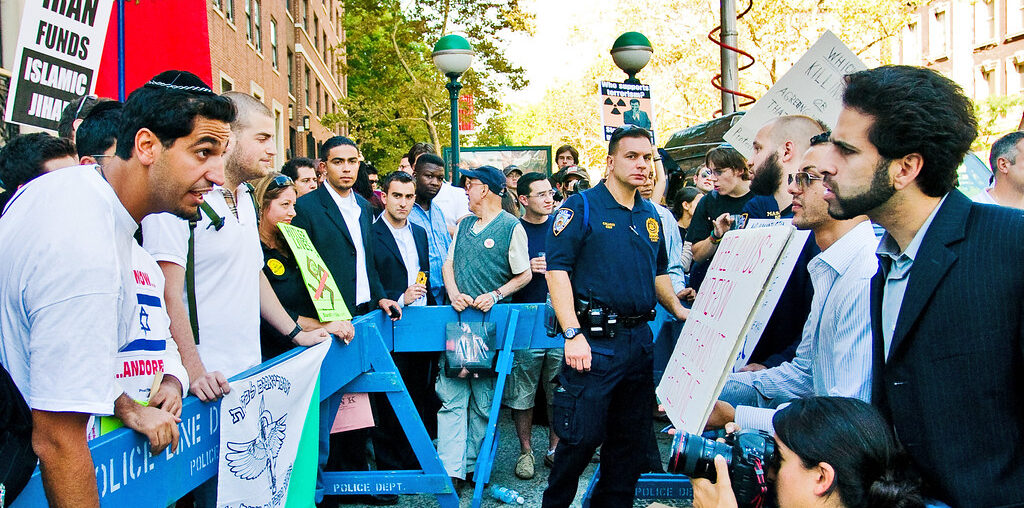“I have to move out of my dorm immediately!” The words that came over the phone were hurried. It was eight o’clock in the morning and I was still groggy.
It was a wintery day in 2014 and my friend’s daughter Sara was one of the New York University students who woke to find eviction notices pasted to their dorm room doors. “Leave immediately with all your possessions,” it said. Frightened and disoriented, they gathered and realized only they, the Jews were targeted. It was a ‘prank’ of the university’s Palestinian student organization.
A mild rebuke from the administration didn’t stop Students for Justice in Palestine (SJP) from disrupting Jewish events and continuing to harass Jewish students. They still had their annual Israel apartheid week and anti-Israel apartheid wall.
During that first year, I got many anguished calls from Sara who I had agreed to mentor as her parents lived far away.
NYU, which was built with Jewish money (the Tisch School for the performing arts is just one example,) was not a comfortable place for Jewish students in the twenty-first century. The NYU Jewish Center was plagued by threats and swastikas painted on walls, and the student government passed an anti-Israel BDS—boycott, divestment and sanctions—resolution.
I smiled ruefully at how much money her parents spent for a prestigious school.
The eviction notice ‘prank’ spread to other campuses with the same lack-luster response. Jewish students had to accept a hostile atmosphere on campuses across America. Being anti-Israel or anti-Zionist wasn’t the same as anti-Semitic was the argument. The United States Civil Rights Act bars discrimination based on race, color, or religion, yet it didn’t protect them.
By her junior year, Sara never wore her star of David and avoided Jewish events. “I have to keep quiet about my support for Israel and just have to hack it for one more year,” she said.
“What about the campus Hillel or the Anti-defamation League? I asked.
“Oh they file complaints, but there’s no fight in them.”
When Jewish students arrive at college filled with hope, nothing prepares them for what awaits. Most, like Sara, keep their heads down to avoid confrontation; most, but not all!
Adela Cojab, a Jewish NYU student senator, was at a student government meeting on Israel Independence Day in 2018. At a celebration held in nearby Washington Square Park, the SJP was out in full force, harassing pro-Israel students with taunts and signs. Jewish students were physically assaulted and two anti-Israel student agitators were arrested. Meanwhile, Adela was being assaulted in a different way; she was shouted down and called a Nazi.
N.Y.U.’s response? The university gave the President’s Service Award, the school’s highest honor, to Students for Justice in Palestine for its “positive impact on the community.”
“They didn’t think it was that big of a deal to give a hate group that award,” Adela said. She complained to NYU but was told not to draw attention to it. A few weeks later, NYU President Andrew Hamilton published an op-ed in the Wall Street Journal asserting he would not have chosen to give the group the award.
In April 2019, Adela, now a senior, filed a civil rights complaint that alleged she suffered “two years of extreme anti-Semitism on the NYU campus which has created an intolerable and unlawful hostile atmosphere for Jewish students.” The complaint asserted that Students for Justice in Palestine “disseminate anti-Israel propaganda laced with inflammatory rhetoric” and “regularly demonize Jewish students who identify as Zionists or proud supporters of the State of Israel.”
Then, in December 2019, President Trump signed an executive order to include national origin in the protected categories of the Civil Rights Act, broadening the definition of anti-Semitism. It gave Jewish students the same recourse as black students who are victimized by racism.
If institutions don’t comply with the Civil Rights Act, they risk losing government funding, and most universities rely on that funding. In effect, President Trump outlawed anti-Semitism on campus, and sent a signal that the federal government was watching.
New York University and the U.S. Department of Education’s Office for Civil Rights (OCR) reached a first of its kind settlement over charges of anti-Semitism on the university’s campus. The school admitted there was a problem and agreed to take measures to correct it.
As a result of this landmark decision, civil rights complaints by Jewish students, denied under the Obama administration, are now being re-opened at Columbia University, Rutgers University, and the University of California, Berkeley.
Campus anti-Semitism is spiking, but now Jewish students have something powerful with which to fight back.


Comments are closed.